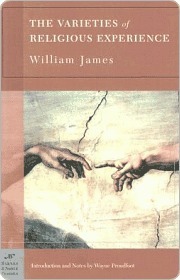More on this book
Community
Kindle Notes & Highlights
James became fond of philosophy and, in particular, of pragmatism. This is a philosophical approach to assessing the truth of the meaning behind a theory or belief via its successful practical application. One of the doctrines that came about from pragmatism was radical empiricism, which was actually proposed by James. It states that experience has to be viewed both at the physical level as well as how meaning or values can arise as a result of that experience. He became deeply involved with this idea, and it would frequently be seen in his writings.
Even more perhaps than other kinds of genius, religious leaders have been subject to abnormal psychical visitations. Invariably they have been creatures of exalted emotional sensibility. Often they have led a discordant inner life, and had melancholy during a part of their career.
When we speak disparagingly of "feverish fancies," surely the fever-process as such is not the ground of our disesteem—for aught we know to the contrary, 103 degrees or 104 degrees Fahrenheit might be a much more favorable temperature for truths to germinate and sprout in, than the more ordinary blood-heat of 97 or 98 degrees. It is either the disagreeableness itself of the fancies, or their inability to bear the criticisms of the convalescent hour. When we praise the thoughts which health brings, health's peculiar chemical metabolisms have nothing to do with determining our judgment. We know
...more
The roots of a man's virtue are inaccessible to us. No appearances whatever are infallible proofs of grace. Our practice is the only sure evidence, even to ourselves, that we are genuinely Christians.
Worship and sacrifice, procedures for working on the dispositions of the deity, theology and ceremony and ecclesiastical organization, are the essentials of religion in the institutional branch. Were we to limit our view to it, we should have to define religion as an external art, the art of winning the favor of the gods. In the more personal branch of religion it is on the contrary the inner dispositions of man himself which form the center of interest, his conscience, his deserts, his helplessness, his incompleteness.
Religion, therefore, as I now ask you arbitrarily to take it, shall mean for us the feelings, acts, and experiences of individual men in their solitude, so far as they apprehend themselves to stand in relation to whatever they may consider the divine.
Religion, whatever it is, is a man's total reaction upon life, so why not say that any total reaction upon life is a religion?
"I do not know that there is a great deal to be said for this world, or our sojourn here upon it; but it has pleased God so to place us, and it must please me also. I ask you, what is human life? Is not it a maimed happiness—care and weariness, weariness and care, with the baseless expectation, the strange cozenage of a brighter to-morrow? At best it is but a froward child, that must be played with and humored, to keep it quiet till it falls asleep, and then the care is over."[13]
The anima mundi, to whose disposal of his own personal destiny the Stoic consents, is there to be respected and submitted to, but the Christian God is there to be loved; and the difference of emotional atmosphere is like that between an arctic climate and the tropics, though the outcome in the way of accepting actual conditions uncomplainingly may seem in abstract terms to be much the same.
It was rather as if my personality had been transformed by the presence of a spiritual spirit. But the more I seek words to express this intimate intercourse, the more I feel the impossibility of describing the thing by any of our usual images. At bottom the expression most apt to render what I felt is this: God was present, though invisible; he fell under no one of my senses, yet my consciousness perceived him."
There are times when God seems far off, but this is always my own fault."—
When happiness is actually in possession, the thought of evil can no more acquire the feeling of reality than the thought of good can gain reality when melancholy rules.
When the passion is extreme, suffering may actually be gloried in, provided it be for the ideal cause, death may lose its sting, the grave its victory. In these states, the ordinary contrast of good and ill seems to be swallowed up in a higher denomination, an omnipotent excitement which engulfs the evil, and which the human being welcomes as the crowning experience of his life. This, he says, is truly to live, and I exult in the heroic opportunity and adventure.
Passivity, not activity; relaxation, not intentness, should be now the rule. Give up the feeling of responsibility, let go your hold, resign the care of your destiny to higher powers, be genuinely indifferent as to what becomes of it all, and you will find not only that you gain a perfect inward relief, but often also, in addition, the particular goods you sincerely thought you were renouncing. This is the salvation through self-despair, the dying to be truly born, of Lutheran theology, the passage into nothing of which Jacob Behmen writes. To get to it, a critical point must usually be
...more


